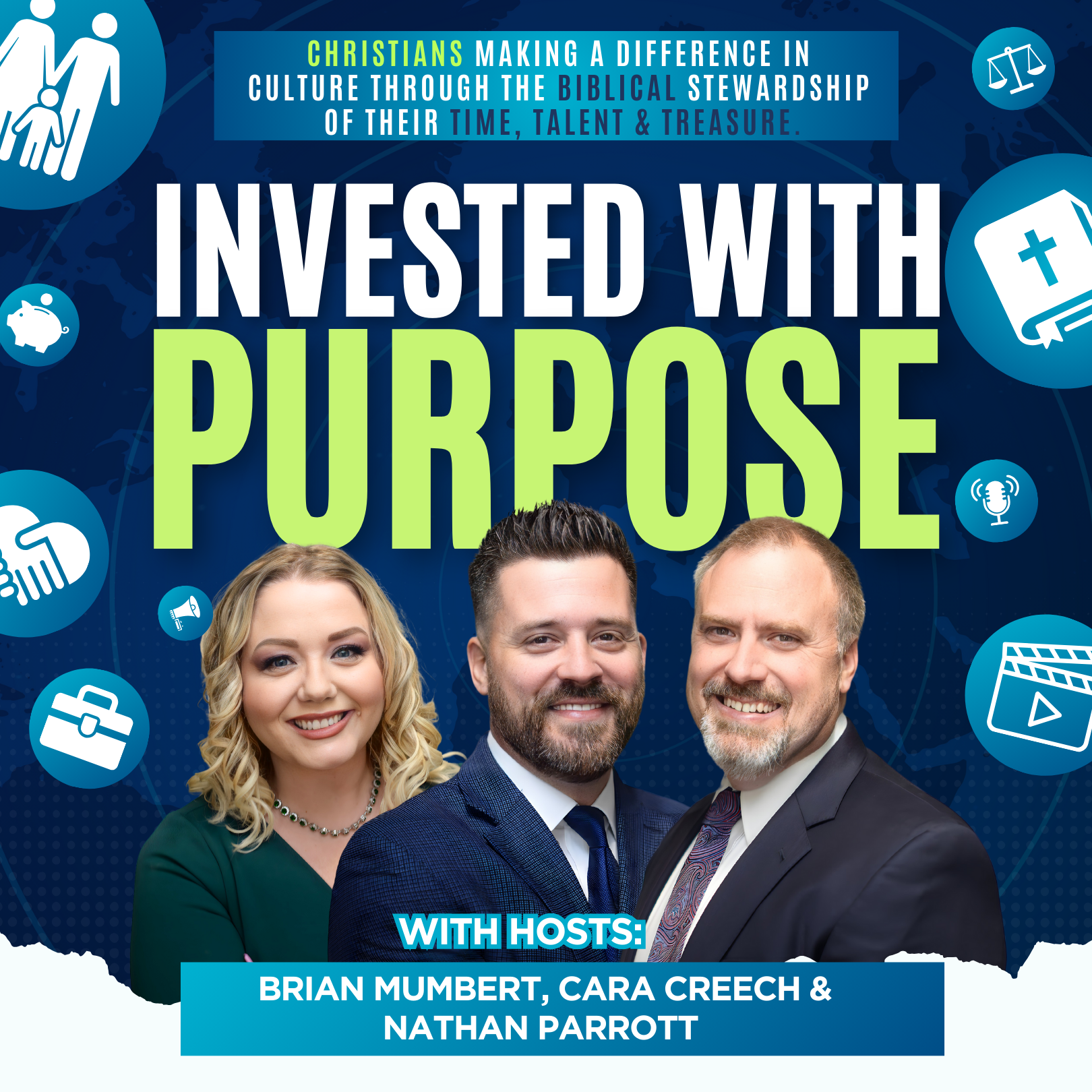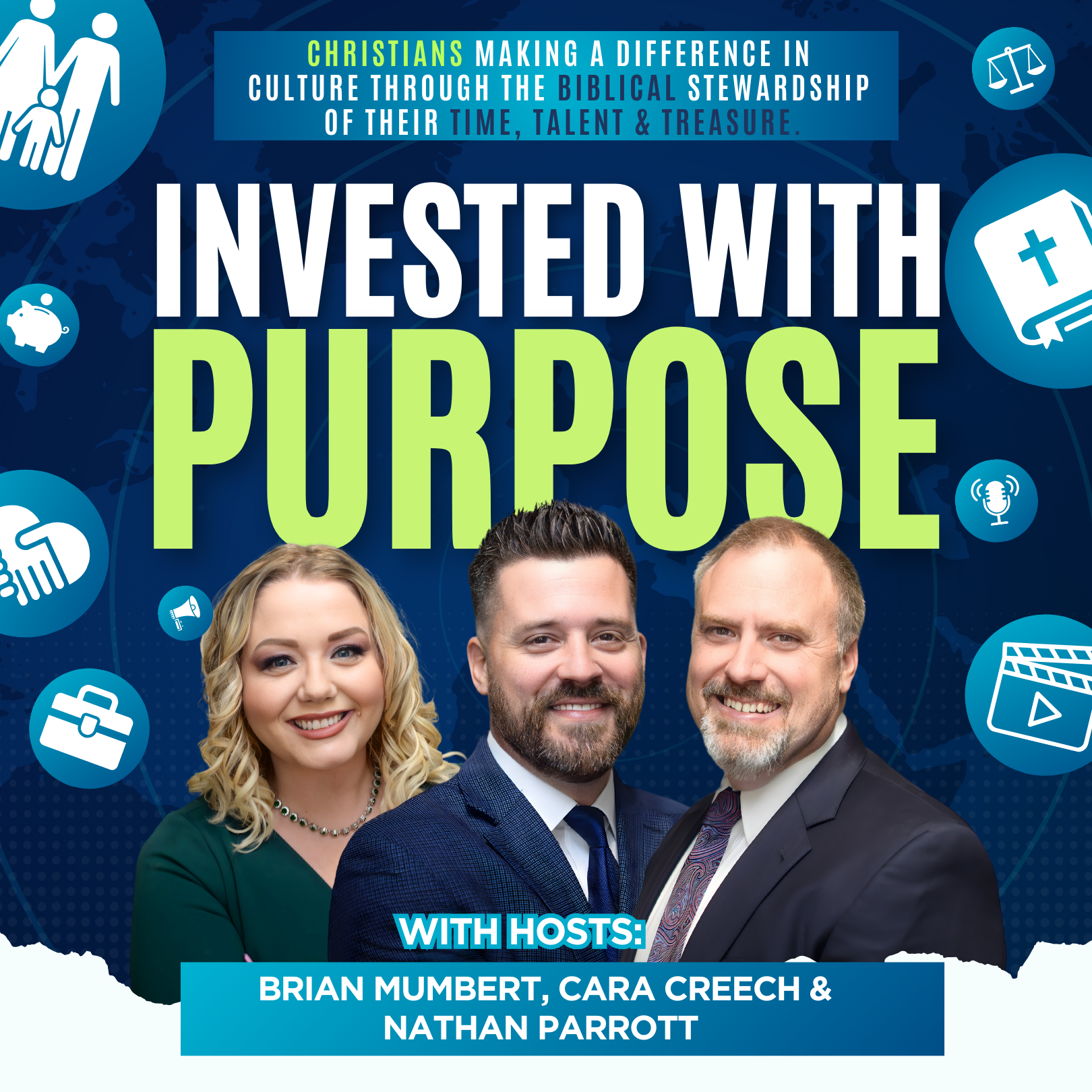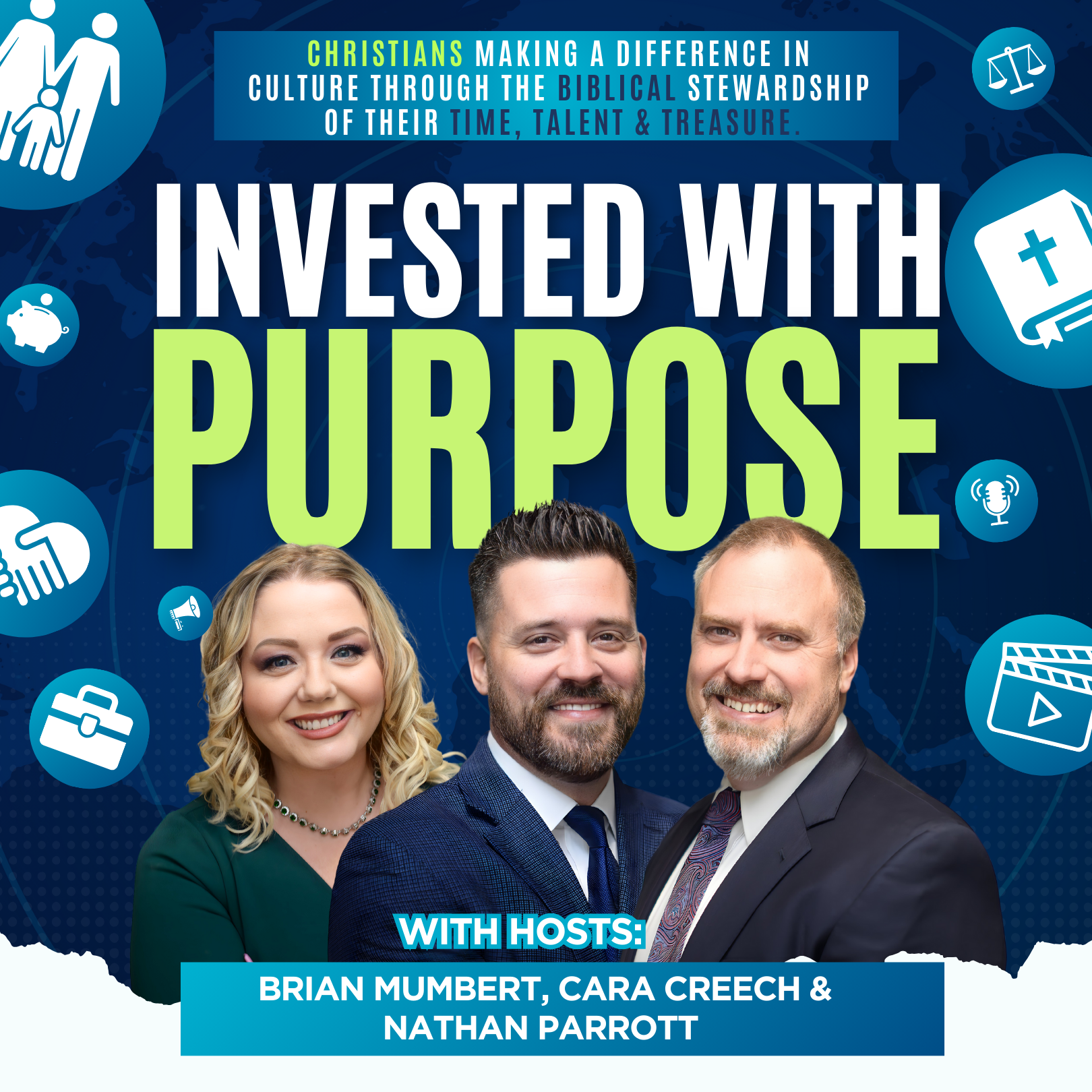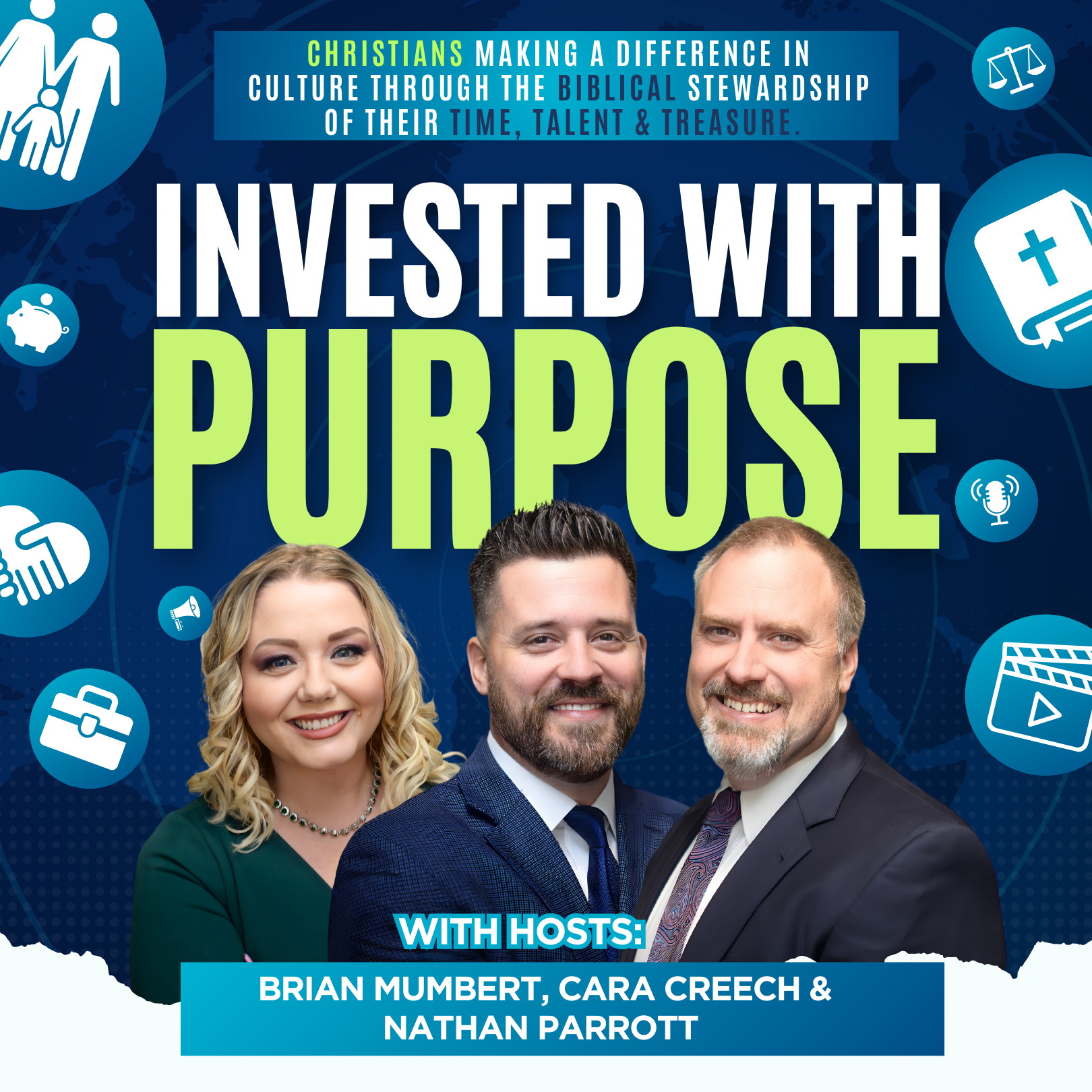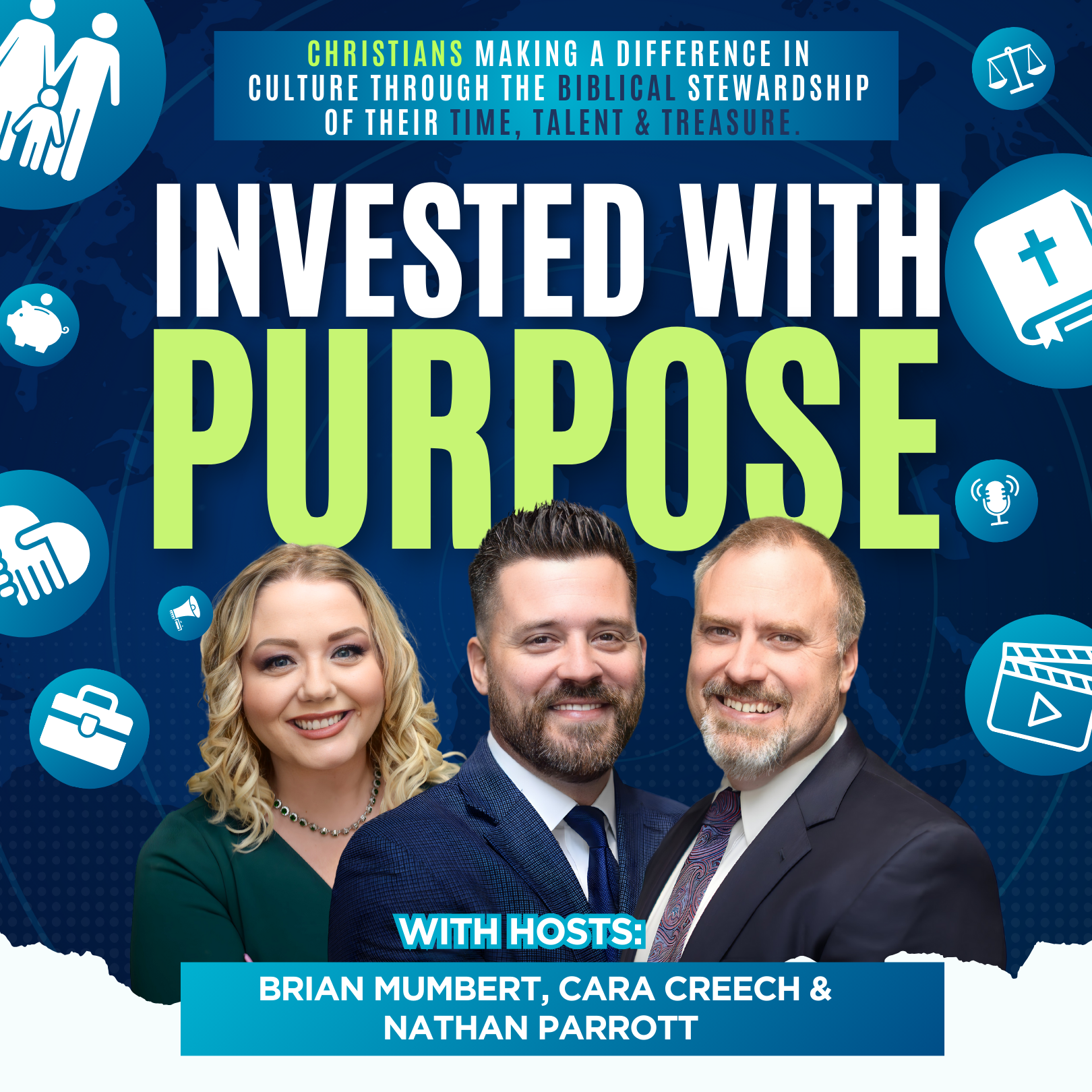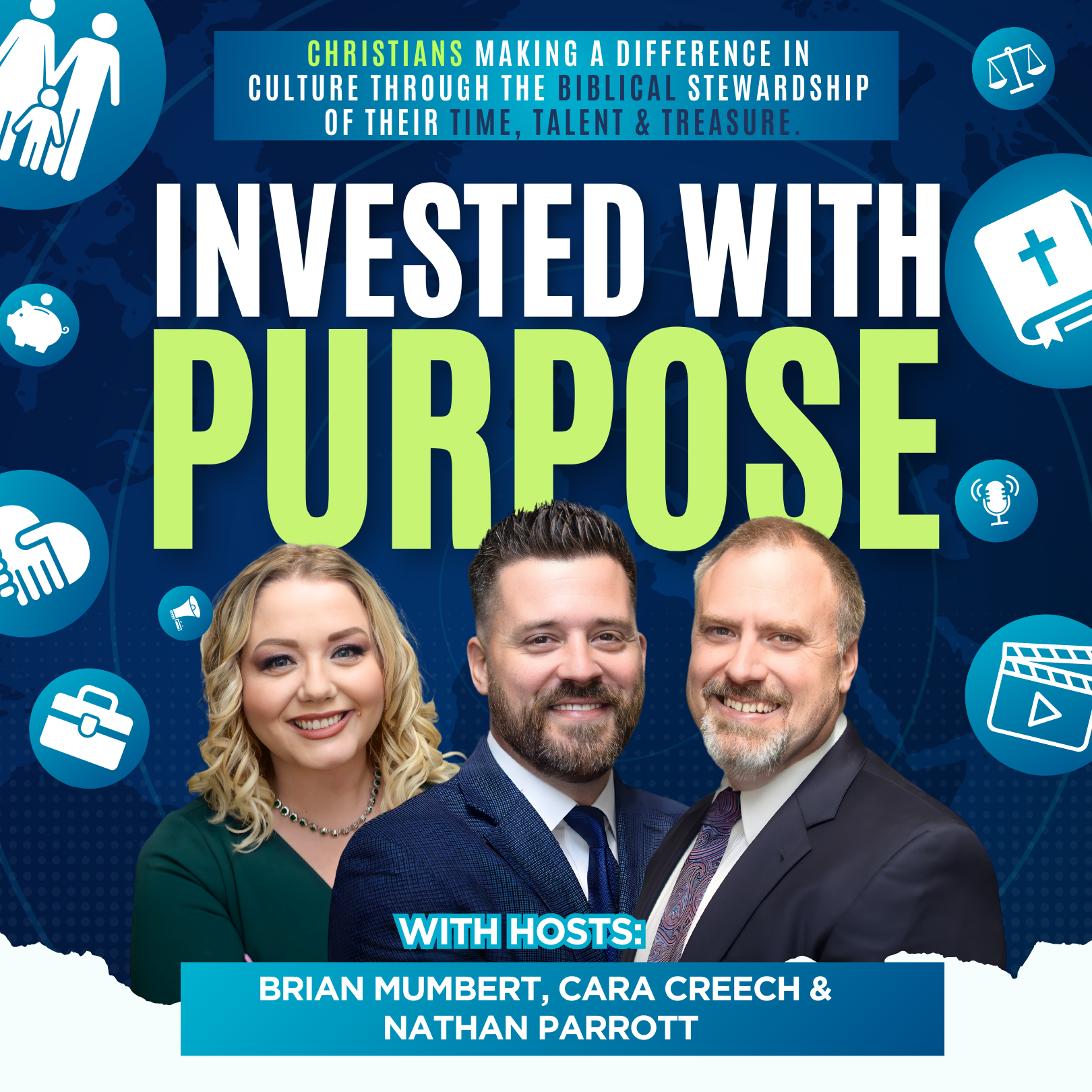Economic Warfare with Kevin Freeman; host of The Blaze show Economic War Room: Episode 6 hosted by Orlando and Nathan
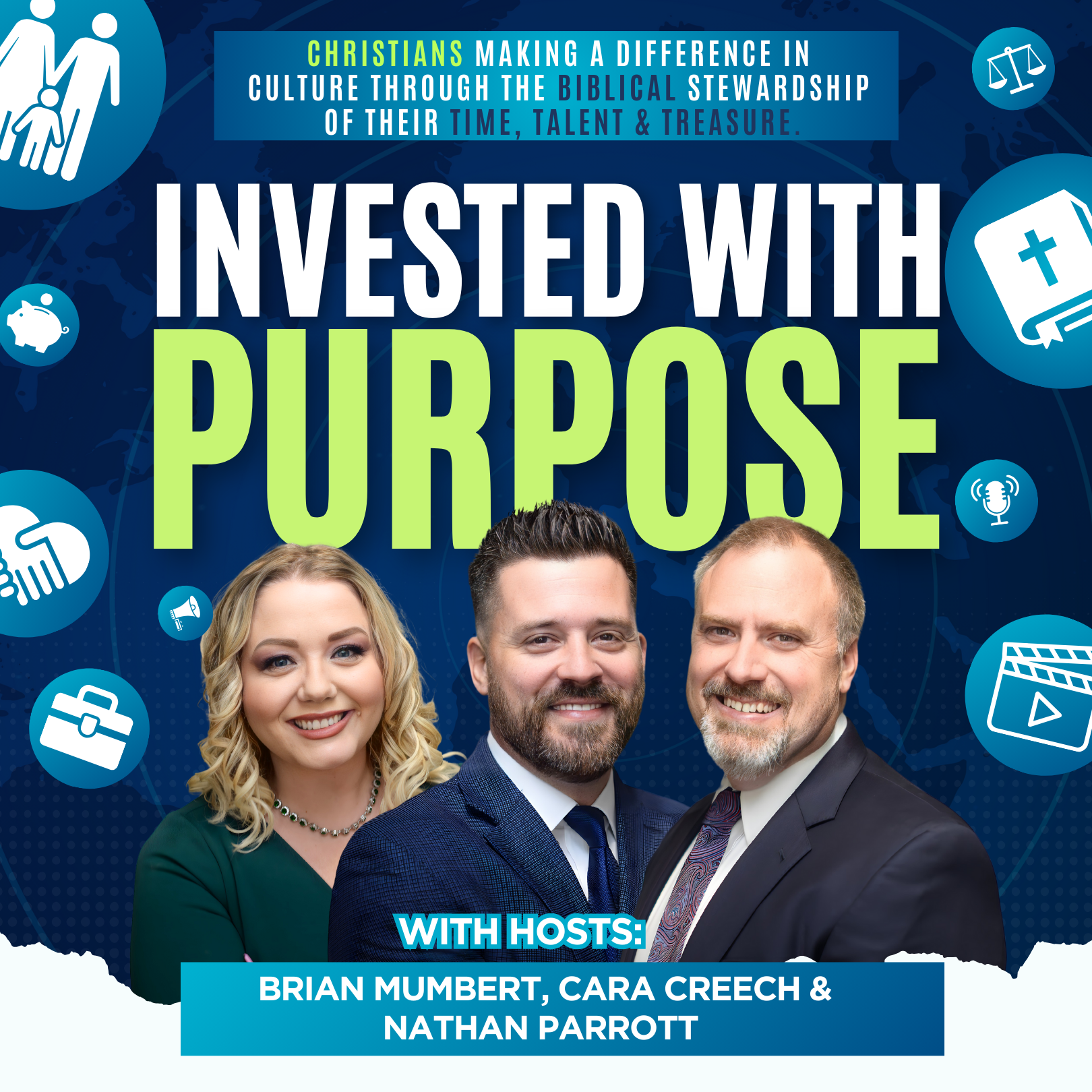

In this episode of Invested with Purpose, Kevin Freeman discusses with Nathan and Orlando, various economic topics and their impact on individuals and society. He covers the concepts of ESG (Environmental, Social, and Governance), Natural Asset Companies (NACs), digital currency, and personal stewardship. He emphasizes the importance of aligning financial decisions with biblical values and offers practical advice for everyday life. Kevin also shares information about his book, 'Pirate Money,' and where to find more resources.
Kevin D. Freeman, the host of Economic War Room on the Blaze, is a platform where he navigates the complexities of the economic landscape with expert insight. Kevin is a distinguished figure in the realm of economic discussions, financial strategy, and Christian stewardship. With a background in finance, Kevin has become a sought after authority of economic security and the impact of government policies on individual investors. His passion for integrating faith into financial decisions is evident in his work, making him a respected voice in the Christian community.
Orlando:
Introducing our honored guest of Invested With Purpose, Kevin D. Freeman, the host of Economic War Room on the Blaze, a platform where he navigates the complexities of the economic landscape with expert insight. Kevin is a distinguished figure in the realm of economic discussions, financial strategy, and Christian stewardship. With a background in finance, Kevin has become a sought after authority of economic security and the impact of government policies on individual investors. His passion for integrating faith into financial decisions is evident in his work, making him a respected voice in the Christian community.
Nathan:
Today we will talk about Kevin's background and how he has navigated the challenges posed by government influence and ensuring that individual investors can play a role in the safeguarding of economic and natural resources.
Orlando:
Grace and peace. Welcome to Invested With Purpose: Making the Most Out of Our Time, Talent, and Treasure. I'm Orlando Aska alongside Nathan Parrott. We are honored today to have as a guest, Kevin Freeman, host of Economic War Room on the Blaze Network. Kevin, how are you doing today, brother?
Kevin:
I'm great, Orlando. How are you?
Orlando:
Very good. Very good.
Nathan:
Kevin, before we dive into some serious topics, first I just want you to tell us a little bit about yourself and how you also got into the world of economics and a little bit of background.
Kevin:
Sure, Nathan. Well, my background is I grew up in Tulsa, Oklahoma. My father was a stockbroker. We grew up as a Cherokee household, so my background is Cherokee and from day one, my father taught us about investing. In fact, he gave us our first allowance in the form of shares of stock, and we had to pick which stock we liked and we learned that sometimes stocks go down, they don't always go up, but he got us into investing and then he taught us the Constitution. And so my dad just passed away two days after, or actually the day after Thanksgiving, but he made me who I am in so many ways.
Orlando:
Absolutely.
Nathan:
That's awesome. So tell us a little bit about Economic War Room and the topics that you cover on the show for people that don't know.
Kevin:
Yeah. Well, I was in investing, started investment newsletter, and then I met a mutual fund manager, a guy named John Templeton with the Templeton Funds, and I met him right after the stock market crash in 1987. So I'm dating myself, I go all the way back. People didn't even know the stock market crash. There's just tiny little blip on the chart. But he hired me and I helped build his private client group. And then I retired from that in the year 2000, got married, we started to have babies, and then the 2008 stock market crash happened.
And as I investigated it with my friend who was a former colleague at Templeton, he was then Chief Investment Officer of all of Wells Fargo, Eric Davidson, he's now a Baylor finance professor. Anyway, Eric and I were talking about how that could be financial terrorism and how easy it would be. So I floated that idea past my friends in government and at the Pentagon and they said, this looks like economic warfare, but we don't understand it. They hired, hired me. I did several papers and was the outside consultant for the Pentagon of economic warfare. And then Glenn Beck learned about it and Glenn said, "Hey, we should make a TV show out of this." And here we have Economic War Room today.
Orlando:
Wow. Well, switching gears here a little, Kevin, want to, we want to talk about a few different topics, ESG, NSAs or NACS, BRI, things of that nature. But before we get into any of that, ESG very hot button topic, an issue a lot of people are talking about, want to lay some groundwork before we move further. What exactly is ESG? I've heard different definitions. It seems very subjective. One person says it means this. The other says it means that. From your perspective and from the knowledge that you have, what does ESG mean?
Kevin:
Well, let's back up to Word began. It began at the United Nations back in the early two thousands, and they said, Hey, how can we take the investment markets and put them on our side to achieve these objectives that we have? And what are the objectives? They're spelled out in the letters? E stands for environment, S stands for social, G stands for governance. And what they really want to do is they want to take control of the environment by taking control of energy. It literally means eliminate fossil fuels and they don't hide this. They want to end carbon use in the world. And the Biden administration is pushing this, which is tragic for reasons I can get into. But that's the first thing is E is eliminate fossil fuels. The S is social justice slash critical race theory. It's what we saw with the Black Lives Matter movement when we started to see curriculum and all of that.
That's what the S stands for. And the G stands for governance, but the type of governance they want is to make sure that every group is represented on the corporate boards of every corporation. We don't want necessarily the most talented people. We want to make sure that there's a certain number from certain genders, backgrounds, LGBTQ and so forth. And it's even mandated that you have to report how many you have of which group on your boards of directors. So as a Cherokee, I qualify as a minority when I sit on a board of directors, but that should not determine why I am valuable there. Hopefully I'm good at what I do and understand the industry well enough to be a board member.
Orlando:
Yeah. Well, it's extremely unfortunate because it seems like quality and getting the right people for the right job, whether that be education or skillset is secondary to diversity. And it seems like there could be a lot of issues and a lot of bad fruit that could come from something like this. As we talk about ESG, we're familiar here with Invested With Purpose, with socially responsible investing or biblically responsible investing and the differences that are there. But we see that investors are reaching out and looking for alternatives like this all the time. Why are companies, why do you believe that companies are so quickly to embrace ESG, even if I would assume that there's some people on these boards who don't even agree with it?
Kevin:
Well, the reason that they're embracing it so quickly is because the big financial investment advisory firms like BlackRock, State Street and Vanguard, which control the vast majority of investment in America. So if you buy from Vanguard, BlackRock or State Street, you're hiring them to manage either an S&P 500 portfolio or to actively manage your investments. And then they don't give their shareholders necessarily the right to vote those shares. So they'll vote them in line with management. I know for example, with biblically responsible investing, if I'm going to hire a firm like Timothy Plan or someone like that, I know that they're going to be voting in line with biblical values.
But I can tell you the values of BlackRock, Vanguard and State Street don't align biblically, and they don't even necessarily align with the interests of the United States of America because they're globalist companies. And the founder of Vanguard, a guy named John Bogle warned us two months before he died in an article he wrote for the Wall Street Journal. "Hey, I love index investing. It's done very, very well. I'm proud to be the father of it," he wrote, "But if you give the control of corporations to a few people like BlackRock, Vanguard, and State Street, it will not be good for America." And that's why they're implementing ESG because the heads of those big firms want to see ESG implemented.
Orlando:
It's two things that it seems that come to mind when I hear that exhumation and from the brief research that I've done, it seems to be power and money, but it seems like these people, these higher ups, whoever they are, they have the power and they have the money. Kevin, what more could they want? I understand this is a spiritual battle that we're fighting, but why? I mean they have power, they have money. I mean, what more did they want? What's all this about?
Kevin:
Well, let's break them down into three groups. One of them is I believe that there is a demonic influence at the heads of nations. I'm reading through Genesis now, and clearly God hardened Pharaoh's heart and he was listening to the devil when he did not want to let the Israelites leave Egypt. And so there are some world leaders that are clearly following demonic paths. Then there are those that feel like they're smarter than the rest of us and that they know better than the rest of us because they've been in unique positions. I spent time in some very wealthy areas of America, and I'll tell you, kids who inherited money think they're smarter than the rest of us. And they went to the best schools. They went to Harvard and Yales and so forth, and if they just let me fix the things of the world, I could fix them. And so their egos are involved. And then the third group would be the useful idiots who their smart friends are telling them this is what we need to do. And so yeah, I want to go to Davos and be part of the World Economic Forum Club and I hang out and play golf, so sure, I'll go along with that.
Nathan:
So Kevin, I had read an article here recently about the natural asset companies, the NACs, and just last week, the New York Stock Exchange. I know we're switching gears here a little bit, withdrew its proposal to create this new tradable asset class. So for those who are not familiar, can you explain a little bit about NACs and why should the average consumer care about this?
Kevin:
That's a great question. And I'm speaking with Marlo Oaks tonight on Economic War Room. Marlo Oaks is the treasurer of Utah, who was one of the first people to highlight this. He wrote an op-ed in the Wall Street Journal about how dangerous it is. Well, here's what a natural asset company is, and to me, under normal circumstances, I would call it a fraud. And why do I call it a fraud? They wanted the accounting rules changed so that a company that can never make money in the traditional sense would be allowed to list on the New York Stock Exchange. Essentially a natural asset company was a way to financialize nature. And let's say that they're public lands and you've got a hundred acres of public lands that you wanted to lease and you're going to lease it to do what? To do what it's doing now. That is the forests are going to clean the air because trees take in carbon dioxide and they put out oxygen.
But then we're going to charge people for what they're already doing naturally, and it becomes an ultimate scam to where you can tie up federal lands. And by the way, on those lands, you can restrict any activity that's not sustainable, which means no hunting, no fishing, those are considered non-sustainable activities. But you could strip mine it for lithium because you're going to get batteries out of it and turn them into electric cars. And so it could be bad for the environment, but we would have to as a nation, pay for that or sell indulgences to company, "Hey, we're producing, producing a lot of pollution over here, so let me buy from the natural asset company an indulgence that allows me to do it." Nobody benefits, but a lot of money changes hands. That's what I consider a scam.
Orlando:
Wow. Wow. With all of this, Kevin, and as a husband, father, you too, Nate, what do we do? The average everyday American that's striving to go about their life, honor God, serve their family, attend their local church, work, we hear about all of these, the NAC, the ESG, all of these people who are pulling the strings, if you would, any practical advice or application that you would have for the everyday person in the midst of all of this economic war? What are we to do?
Kevin:
Yeah, well, great question. Watch Invested With Purpose, obviously.
Watch Economic War Room every week, 30 minutes a week, we cover a topic like this, but we don't just cover it and it's not just a talking head thing. What we do is we produce an economic battle plan with actual action steps of what you need to do. We recap the episodes, you get it free. It's a PDF document that you can get, like a free newsletter, and you get all that at economicwarroom.com. You can sign up for our battle plans and we'll send you a link so that you would've known about natural asset companies before they happened. And then one of the action steps was a comment period. So let the SEC know. And the last thing that we recommend to everybody's find a way to weaponize your money. And I know that's a harsh term for Christians. A lot of Christians push back and say, weapon, I don't want to weaponize.
Well, how about put on the whole armor of God, the home salvation, the breast of righteousness, the belts of truth, shields, the gird your loins, all of that, the sandals of peace, all of that is a part of fighting a war. We're in a war. It's a spiritual war manifesting as an economic war. And what you need to do is weaponize your money so that you give it, spend it, and invest it in line with God's principles. So give to places. Don't give to Harvard.
If Harvard's going to have a president that's plagiarizing and they're going to be producing medical research that apparently is falsified, give it to places that can advance the kingdom. Spend with people who are going to do good things. Don't buy everything you buy from China and support the Chinese Communist Party and invest. Find good ways to invest. That's what I love about biblically responsible investing. That's what I love about Timothy Plan and others, invest. And by the way, Timothy Plan is a sponsor of Economic War Room. So I full disclosure, but the point being, it doesn't have to be Timothy Plan. Find investments that align with your values.
Orlando:
Absolutely. Right.
Nathan:
So Kevin, switching gears here just a little bit. Digital currency has been a hot topic here with Bitcoin raising interest of all sorts of investors. So what would be your solution to the question of dealing with digital currency as the US continues to move toward a cashless society?
Kevin:
Well, the government's going to foist on us, a central bank digital currency. They've told us flat out executive order 14067 from the Biden administration. President Biden signed it two years ago, and it says, we want to move to that cashless society and we want to make sure that that cash, whatever it's created, does those things we talked about earlier, ESG and diversity, equity and inclusion, that's the purpose of our money. Now wait a minute. That should not be the purpose of money. Money should be neutral and it should be useful.
So what we've recommended is an alternative is what I call pirate money. It's based on the constitution, it's based on biblical principles, and that is making gold and silver transactional again, by bringing them into the modern economy so that you would deposit in a state run depository gold and silver and they'd give you a debit card where you could go spend that gold and silver as you saw fit, which would protect your purchasing power, but at the same time, protect your privacy because the state will promise not to use it against you like a central bank digital currency, aka CBDC.
Orlando:
I'm sure it is in the book Power Money, and we have our copy back here, but for the listeners, they hear that and I could just hear, I mean I'm even thinking as you're talking, what does that look like practically step by step? How do we implement something like that with the forces that be? What are the steps to implementing something like that, having gold and silver as the standard? Kevin, what does that look like?
Kevin:
Well, Orlando, I've got good news is I'm speaking, I mentioned with the treasurer of the state of Utah. I was on the phone, I was with the Attorney General of the state of Texas yesterday. I was on the phone with Texans here and 21 states are looking at this practically, how do you do it? The great news is already exists is a transactional gold company known as Glint Pay. There are several others, ESIS and Load and others, where you can go on your iPhone or your Android phone and you can download an app and you can wire money to them. They will hold it in the form of gold and then they'll give you a MasterCard and you can go spend it when you want to.
We're talking about marrying that with Article one, section 10 of the Constitution, which says, no state shall make anything other than gold and silver coin legal tender in the state. You take what's been in the Constitution from its inception, add to it modern technology. It's explained all in the book Pirate Money, which you can get at piratemoneybook.com, but it practically works. I went in and bought coffee the other day and a muffin, and I spent one 16th of a gram of gold to buy it.
Nathan:
Oh, wow. That's amazing. Yeah, I didn't know that you could do that, so that's pretty cool.
Orlando:
Well, one thing I did want to ask, you talk a lot about the constitution, and I think it is important that our children are learning these things and the founding documents and have a clear understanding about our country. Wouldn't there have to be a level of literacy that we're doing our job in communicating with our children in the schools? I think it's great. I just see a lot of roadblocks unfortunately, with these powers that would come against something like this. But I guess that's how it works, the minority that it may seem, and with how this country was founded, standing up for something, believing, having conviction in what they're doing, wanting to honor God with it moving forward. Those are just some of the thoughts that I have. It just seems like such a big undertaking.
Kevin:
Those are fair thoughts, and if you read the book, you'll see that historically it makes sense, but it took one guy with one smooth stone to go against one giant who mocked God. All the armies were sitting around waiting for David to show up with a sling and a stone. But here's how I've done it. We went into the state legislature, I talked to Republican and Democrat offices, walked into the staffer and said, "Hey, I want to show you something. I'm going to buy gold right in front of you and then I'm going to spend it right in front of you. I'll go to Amazon and spend it right in front of you." And you know what they said, "I want that. Give me that." Well, if we show it to enough people and we've made it a feature on the economic war room, we've gotten in 21 state legislators, I'm going to fly from here to Georgia, then I'm going to go from there to Tennessee, and then I'm going to go from there to Oklahoma.
I mean just state after state after state, people are loving this. And 21 states represents the third-largest economy on the planet. We're working in Florida and pushing it there. The Senate wants to slow it down, the house wants to go a little faster. Well guess what? We're going to go as fast as we can go through every open door the Lord provides, and we're going to get this thing passed. And when we get it passed, it will take us back to sound money at an individual level issued by a state, which it's monumental. It's a big win over a great giant, but all it took was one smooth stone and a young boy who believed.
Orlando:
Absolutely. That's right.
Nathan:
So Kevin, Orlando and I are curious on your personal approach to stewardship. So I got a question on that. As someone deeply involved in the economic discussion, how do you personally approach stewardship in allocating your time, talent, and treasure in alignment with your faith?
Kevin:
Well, first off, as we begin with the notion that everything that I have, my time, my family, my person, my treasure, everything belongs to God a hundred percent. I tithe, not because it's a legal requirement, but it just makes sense to me that you give the first 10% to God. So I tithe. Then I look for opportunities when God gives me excess and sometimes he gives me excess in the form of time. Sometimes he gives me excess in the form of money, and then I try and give. I wrote a lot of this in a previous book called Game Plan, which is how to protect yourself from the coming cyber economic attack. But the publisher tried to reject it initially. They said, well, there's too much Christian content in that. Well, that's my life. That's who we are and what we promote. And so everything about my life, I want to be honoring God. I wish it were so now, I wish I could look at you and say that's already happening. But I'm working towards that to where every moment of my life honors God, even the restful times, one day a week.
Orlando:
Amen. So we want to show this here to all the viewers that we have our own copy of the Game Plan.
Kevin:
That's awesome.
Orlando:
And everybody go out and grab this. So also Kevin, for our listeners seeking to enhance their personal stewardship, what advice or lessons learned from your own journey would you share with those people?
Kevin:
Well, I worked for a big investment house Templeton, and we managed, our division was two and a half billion dollars, which is a lot of money, but overall, the company was hundreds of billions, 300 billion when I left. And it's probably much higher now. Your investment impact is almost as great as your giving impact in a lot of cases because it will set the tone for many people. So make sure that you're being good steward in your giving, spending and investing. In terms of giving, there are more opportunities to give than we have money, and that's just the poor you'll have with you always kind of thing that Jesus mentioned. And I get hit up. I just try and pray over it and just say, Lord God, would you have me give here? And sometimes the answer that I hear in my spirit seems the strangest thing really there.
And then later on I hear how really it impacted someone. But I support a lot of great things and my friends, like Art Alley from Timothy Plant, introduced me to Patriot Academy and I'd known Rick Green for years, but I didn't know Patriot Academy. Next thing I know, I'm finding myself writing checks to Patriot Academy and I love those guys. So listen to your spouse, listen to the Lord, listen to your friends and look for places because you might be thinking, I'm doing really good giving to my alma mater, but they do good things and then yet they're ruining the lives of children. And we see that in colleges all the time. So it's going to take wisdom and it's going to take prayer and it's going to take counsel.
Orlando:
Right. Yeah, I really appreciate that, Kevin, and how the foundation of what you're communicating is that ultimately all things belong to God. We just have it for a moment, and just like the Apostle Paul said, whether I eat or drink, I do all things unto the glory of God. And that's not just saying it's about eating and drinking literally, but whether it's the big things or the small things, how we give, how we spend, how we invest, we're to have God's heart in mind as we're doing it. Not to check it off a list of one to 10, but to have God at the center of everything on our list that we're going through.
So yeah, just really encouraging stuff that you are communicating there. And so Kevin, I'm trying to be as practical as possible. So we know Economic War Room, that's something that we need to make sure that we're tuning into to be aware of what's going on. But if there was just a couple things, one or two things that the listener and viewers should be mindful of as they go about their life and the economy, would it be power, money? Would it be mindful about ESG, where to invest? What are some of the things you would say be mindful of this?
Kevin:
Well, the first thing that you need to be mindful of is what the scripture says. If you're not faithful with your unrighteous mammon, you will not be trusted with true riches. And the surrounding that whole passage, you have the wicked steward who Jesus praised because he used his master's money to buy friendships. You have the fact that money is a small thing. It says, if you're faithful in the small things, I'll set you over greater things. If you're not faithful with money, you'll never get to greater things. Meaning money is a small thing by definition. So put money in its rightful place. I'm writing a book on that called The Economic War of the Heart, and the purpose of that book, it's not out yet, is to tell the story of King Josiah and how he came to know the word of God. And it's not what you think.
It's not because he was a good king and at eight years old, he knocked over a dusty old book in the temple and found it. It's because when he started using the money in the temple for God's purpose and got it out to the people, it says in 2 Chronicles 34:14, "And when they brought out the money that had been brought into the house of the Lord, Hilkiah the priest uncovered the book of the law of the Lord as given to Moses." In other words, the money had gotten in the way of their finding God's word. And I think that's true in the American church today. Money gets in the way. Pastors say, well, I can't say this because I might lose my tax-exempt status. Money is getting in the way. And so get faithful with your unrighteous mammon, your giving, spending and investing.
Practically how do you do that? Check out what you're giving to, spend with things that align with your values. You can tell by their commercials on television. You can look at a movie commercial, maybe I don't want to support Disney right now. And then your investing should line up the same way. It should be aligned with your values and not supporting something that destroys. And basically, if you cause one little one to stumble, it'd be better to have a millstone tied around your neck and be tossed into the sea. I don't want to hear, "Hey Kevin, you invested in a company that caused thousands or millions of little ones to stumble." Oh, so it should not be money first. It needs to be money as in its second place as a small thing to be faithful with, but not to determine what and how we do things.
Orlando:
Absolutely, absolutely.
Nathan:
So Kevin, number one, we want to thank you for coming on the show today and sharing your insight. We also want to give you a little plug here. So tell us where we can find you. Tell us, we talked a little bit about the book, Economic War Heart. Tell me everything that you got going on so our listeners know where to find you and what to look out for.
Kevin:
Two things I'll bring up, one of them is economicwarroom.com. People should go there and sign up to receive the weekly battle plan. We don't spam people, they sign up. We'll send them an email a week or so that will say, "Hey, here's what's going on, what we covered on the show, and here's a link to the battle plan for how you can take action and be faithful with your unrighteous mammon." So it's one stop shop there. Second thing, I strongly encourage people to get a copy of this book, Pirate Money. You need to understand what money actually is, what God intended. God's money is gold and silver. He didn't intend unjust weights and measures like a paper dollar backed by nothing printed by the government and sending our children to great debt in the future.
That's not God's intention. Learn what money is supposed to be, what the Constitution says, what a state can do to help people, what a state can do to make gold and silver transactional. It's all written in this book Pirate Money, and that is a fight worth fighting. You can learn about pirate money at piratemoneybook.com. You can buy it through Amazon, which is actually, I wished I could say, I've got this big publishing house and we can send us $20 and we'll send you a copy. We're just not geared for that. So we use Amazon Print on Demand, but you can buy bulk from us and pass them out, and you can learn all of that. Links to Amazon page, but also how to buy in bulk at piratemoneybook.com.
Orlando:
All right, well that sounds great. So we have the Game Plan, pirate Money, and as of right now, you're working on Economic War of the Heart. And listeners, just remember to be mindful of how you steward, how you give, how you spend, and how you invest. Kevin, thank you so much for joining us today. Really appreciate your heart and glad we could have this conversation here.
Kevin:
Thank you, Orlando. Thank you, Nathan. God bless you both.







